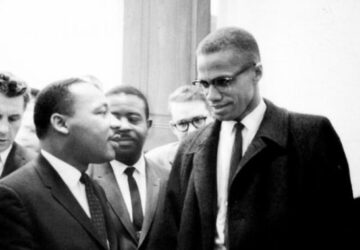Joe Phelan in Edsitement:
 When most people think of the civil rights movement, they think of Martin Luther King, Jr., whose “I Have a Dream” speech, delivered on the steps of the Lincoln Memorial in 1963, and his acceptance of the Peace Prize the following year, secured his place as the voice of non-violent, mass protest in the 1960s. Yet the movement achieved its greatest results—the 1964 Civil Rights Act and the 1965 Voting Rights Act—due to the competing and sometimes radical strategies and agendas of diverse individuals such as Malcolm X, whose birthday is celebrated on May 19. As one of the most powerful, controversial, and enigmatic figures of the movement he occupies a necessary place in social studies/history curricula.
When most people think of the civil rights movement, they think of Martin Luther King, Jr., whose “I Have a Dream” speech, delivered on the steps of the Lincoln Memorial in 1963, and his acceptance of the Peace Prize the following year, secured his place as the voice of non-violent, mass protest in the 1960s. Yet the movement achieved its greatest results—the 1964 Civil Rights Act and the 1965 Voting Rights Act—due to the competing and sometimes radical strategies and agendas of diverse individuals such as Malcolm X, whose birthday is celebrated on May 19. As one of the most powerful, controversial, and enigmatic figures of the movement he occupies a necessary place in social studies/history curricula.
Malcolm X’s embrace of black separatism shaped the debate over how to achieve freedom and equality in a nation that had long denied a portion of the American citizenry the full protection of their rights. It also laid the groundwork for the Black Power movement of the late sixties. Malcolm X believed that blacks were god’s chosen people. As a minister of the Nation of Islam, he preached fiery sermons on separation from whites, whom he believed were destined for divine punishment because of their longstanding oppression of blacks. Whites had proven themselves long on professing and short on practicing their ideals of equality and freedom, and Malcolm X thought only a separate nation for blacks could provide the basis for their self-improvement and advancement as a people.
More here. (Note: In honor of Black History Month, at least one post will be devoted to its 2024 theme of “African Americans and the Arts” throughout the month of February)
